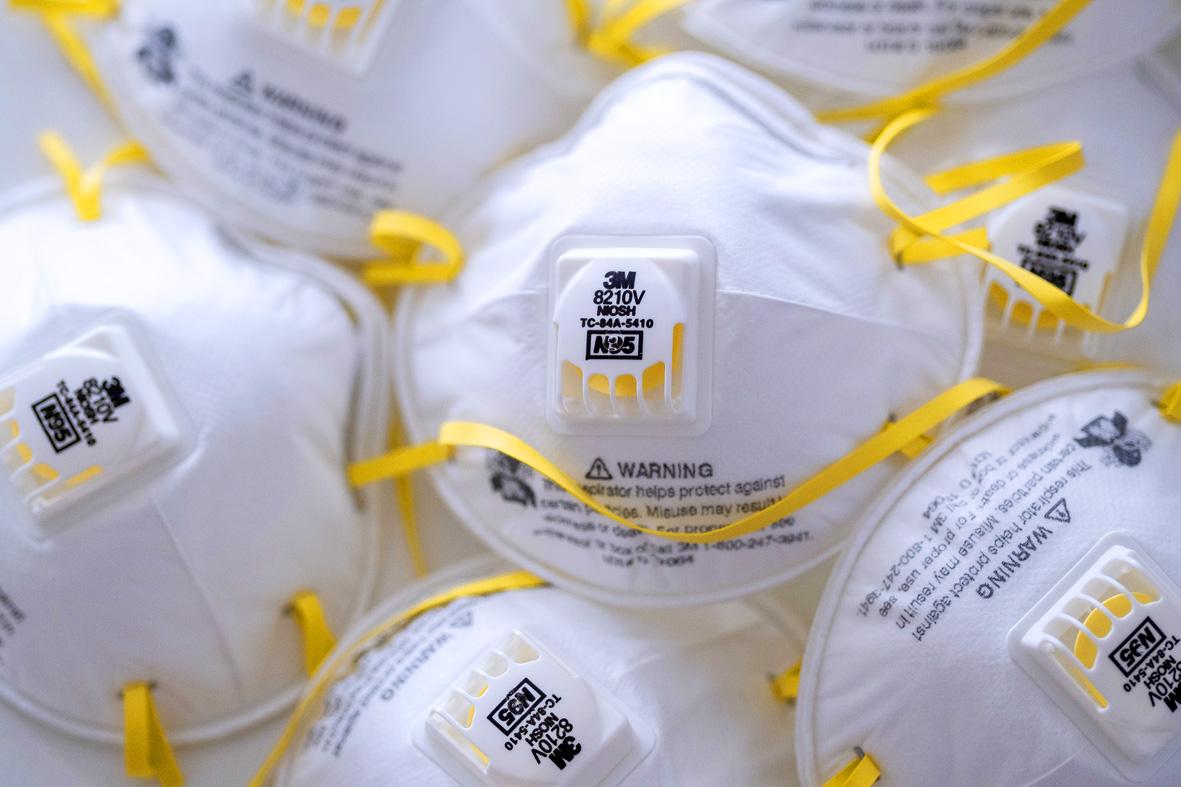The inventor of the key technology used in N95 respirator and medical masks is Taiwan-born scientist Peter Tsai (蔡秉燚), the Nonwoven Fabrics Industry Association said on Facebook on Monday.
Tsai was a professor in the University of Tennessee’s material sciences and engineering department for 35 years before retiring last year, and is a world-renowned expert in nonwoven fabrics.
He invented the electrostatic charging technology used to produce the filter media of masks, including medical and N95 masks, as well as heating, ventilating and air conditioning filters, and holds 12 US patents and 20 commercial license agreements for his inventions.

Photo: Bloomberg
While Tsai might not be a household name, he recently became familiar to Taiwanese due to an article he wrote answering common questions about sterilizing and reusing N95 masks, the association said.
The “N” in the respirator name means “not resistant to oil,” and “95” means the ability to remove at least 95 percent of submicron particles, such as influenza viruses, dust, pollen, haze and smoke, the association said.
N95 respirators are made of four plies of polypropylene media: an outer veil that can resist moisture, a double-ply filtration layer and an inner layer that is in contact with the skin, it said.
The outer and inner layers — usually made of spun-bond nonwoven and thermal-bond nonwoven fabrics — have low filtration efficiency and breathing resistance, and serve primarily to contain the middle layer, it said.
The middle layer, made of meltblown nonwoven fabrics, seals any gaps through which submicron particles might be able to enter and is key to the N95 respirator’s filtration efficiency, it said.
To manufacture meltblown nonwoven fabrics, two fundamental technologies are required: melt blowing and electrostatic charging, with the former being a nonwoven process that makes a fabric composed of microfibers; and the latter being the embedding of permanent charges in a fiber to form an electret that enhances filter efficiency by electrostatic attraction, the association said.
Tsai’s research in melt blowing and electrostatic charging greatly improved the filtration efficiency of nonwoven fabrics used in masks, allowing submicron particles to be captured and stopped from traveling through the masks, it said.
Tsai found that a charged medium has 10 times the filtration efficiency of an uncharged medium, meaning that one ply of charged fabric can have the same power as 10 plies of the same uncharged fabric, and better air permeability, too, it said.
According to the article, when high-quality masks are exposed to elevated temperatures, such as 70°C, for 30 minutes, the chances that a charge will decay are extremely low, so people can repeat this sterilizing method multiple times without a noticeable loss in filtration efficiency, as long as the masks are suspended without coming into contact with or being near a metal surface, Tsai said in an article for the University of Tennessee Research Foundation that was published on March 25.
As for treating masks with bleach, the article states that charges will not degrade as long as the ingredients do not include surfactants, while hot water generally does not affect the mask’s filtration performance, as long as the inner and outer veils of the mask are not made of paper-like tissue.

The Central Election Commission has amended election and recall regulations to require elected office candidates to provide proof that they have no Chinese citizenship, a Cabinet report said. The commission on Oct. 29 last year revised the Measures for the Permission of Family-based Residence, Long-term Residence and Settlement of People from the Mainland Area in the Taiwan Area (大陸地區人民在台灣地區依親居留長期居留或定居許可辦法), the Executive Yuan said in a report it submitted to the legislature for review. The revision requires Chinese citizens applying for permanent residency to submit notarial documents showing that they have lost their Chinese household record and have renounced — or have never

A magnitude 5.6 earthquake struck off the coast of Yilan County at 12:37pm today, with clear shaking felt across much of northern Taiwan. There were no immediate reports of damage. The epicenter of the quake was 16.9km east-southeast of Yilan County Hall offshore at a depth of 66.8km, Central Weather Administration (CWA) data showed. The maximum intensity registered at a 4 in Yilan County’s Nanao Township (南澳) on Taiwan’s seven-tier scale. Other parts of Yilan, as well as certain areas of Hualien County, Taipei, New Taipei City, Taoyuan, Hsinchu County, Taichung and Miaoli County, recorded intensities of 3. Residents of Yilan County and Taipei received

Taiwan has secured another breakthrough in fruit exports, with jujubes, dragon fruit and lychees approved for shipment to the EU, the Ministry of Agriculture said yesterday. The Animal and Plant Health Inspection Agency on Thursday received formal notification of the approval from the EU, the ministry said, adding that the decision was expected to expand Taiwanese fruit producers’ access to high-end European markets. Taiwan exported 126 tonnes of lychees last year, valued at US$1.48 million, with Japan accounting for 102 tonnes. Other export destinations included New Zealand, Hong Kong, the US and Australia, ministry data showed. Jujube exports totaled 103 tonnes, valued at

BIG SPENDERS: Foreign investors bought the most Taiwan equities since 2005, signaling confidence that an AI boom would continue to benefit chipmakers Taiwan Semiconductor Manufacturing Co’s (TSMC, 台積電) market capitalization swelled to US$2 trillion for the first time following a 4.25 percent rally in its American depositary receipts (ADR) overnight, putting the world’s biggest contract chipmaker sixth on the list of the world’s biggest companies by market capitalization, just behind Amazon.com Inc. The site CompaniesMarketcap.com ranked TSMC ahead of Saudi Aramco and Meta Platforms Inc. The Taiwanese company’s ADRs on Tuesday surged to US$385.75 on the New York Stock Exchange, as strong demand for artificial intelligence (AI) applications led to chip supply constraints and boost revenue growth to record-breaking levels. Each TSMC ADR represents